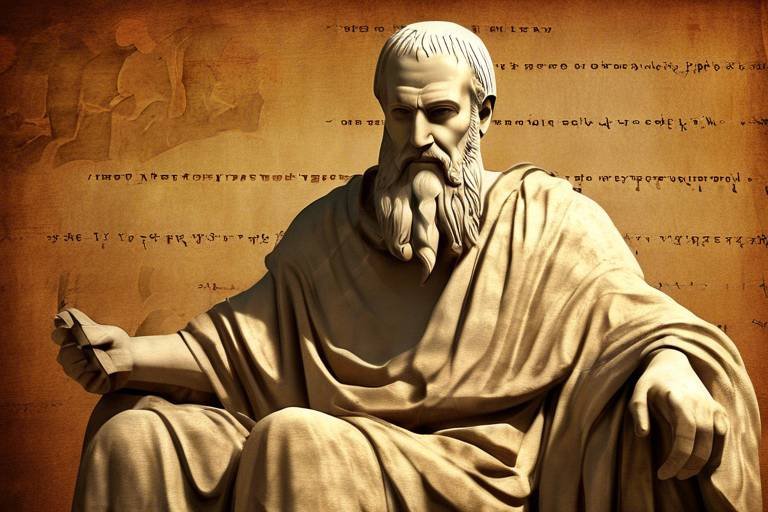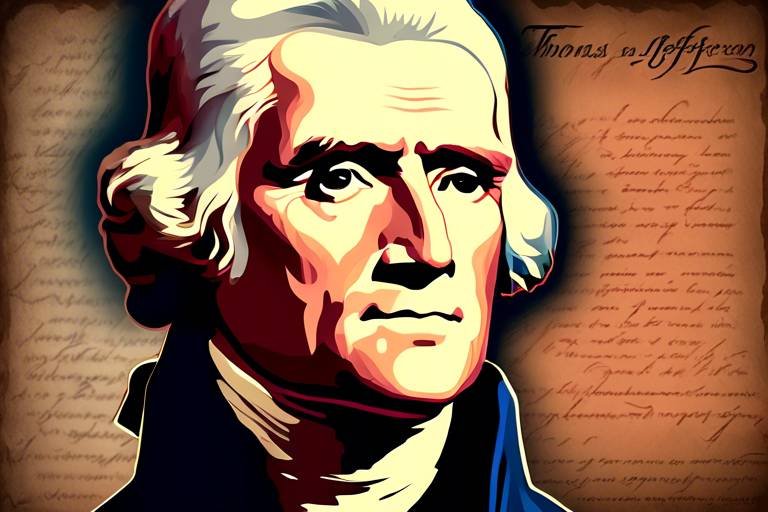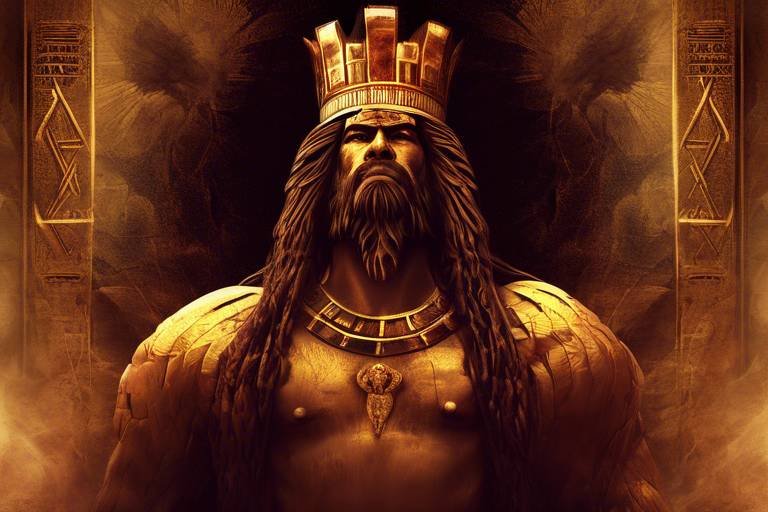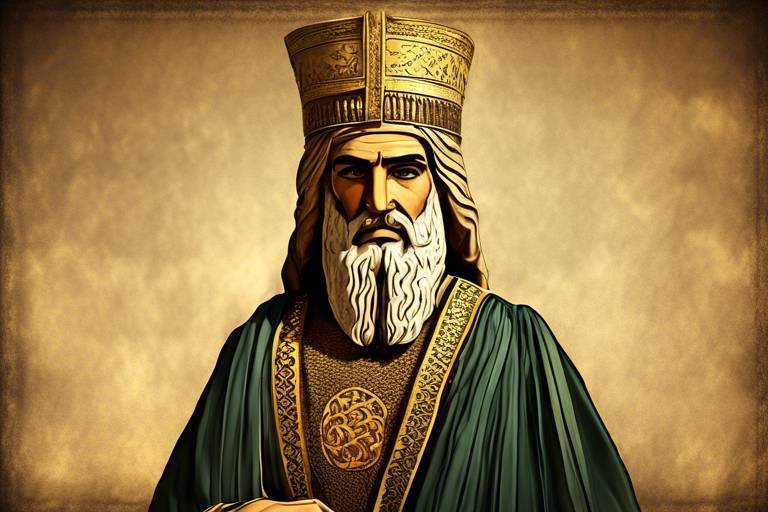Socrates: The Father of Western Philosophy
Socrates, an ancient Greek philosopher, is widely regarded as the father of Western philosophy. His teachings and methods have had a profound influence on the development of philosophical thought in the Western world.

Life and Background of Socrates
Socrates, an ancient Greek philosopher, is widely regarded as the father of Western philosophy. His teachings and methods have had a profound influence on the development of philosophical thought in the Western world.
Exploring the life and background of Socrates reveals a fascinating journey of a man who laid the foundation for Western philosophy. Born in Athens around 470 BC, Socrates led a life filled with intellectual pursuits and philosophical inquiries.
Before embarking on his philosophical journey, Socrates served as a hoplite in the Athenian army during the Peloponnesian War. His military service instilled in him a sense of discipline and courage that would later shape his philosophical approach.
As he delved deeper into the realms of knowledge and wisdom, Socrates developed the Socratic method, a dialectical approach to seeking truth through questioning and critical thinking. This method became a hallmark of his teachings and interactions with others.
However, Socrates' philosophical pursuits and unorthodox methods stirred controversy in Athens. Accused of impiety and corrupting the youth with his radical ideas, he faced a trial that ultimately led to his conviction and execution by drinking hemlock in 399 BC.
Despite his tragic end, Socrates' legacy endured through his student Plato, who immortalized his teachings in a series of dialogues. These dialogues not only captured the essence of Socratic philosophy but also provided valuable insights into his beliefs and principles.
Delving into the philosophical teachings of Socrates unveils a profound exploration of fundamental concepts such as the pursuit of knowledge, the nature of virtue, and the importance of ethics and morality.
Central to Socrates' philosophy was the belief that true wisdom comes from recognizing one's ignorance. Through his relentless questioning and examination of beliefs, he sought to uncover the underlying truths that govern human existence.
Moreover, Socrates emphasized the importance of virtue as the ultimate goal of human life. He argued that living a virtuous life based on reason and self-awareness leads to true happiness and fulfillment.
In his ethical teachings, Socrates emphasized the significance of living a just and moral life, guided by rational principles rather than external rewards or punishments. His ethical insights continue to shape discussions on morality and ethical behavior in contemporary society.
Examining the significance of Socrates' dialogues, particularly those penned by Plato, offers a window into the philosophical exchanges that defined his teachings. These dialogues serve as a testament to Socrates' method of inquiry and his unwavering commitment to seeking truth.
Through dialogues such as "The Republic" and "Phaedo," Socrates engages in thought-provoking discussions on justice, truth, and the nature of reality. His dialogues not only challenge conventional beliefs but also inspire readers to question their own assumptions and beliefs.
By engaging in dialectical conversations with his interlocutors, Socrates demonstrated the power of critical thinking and intellectual inquiry in uncovering deeper truths about the world and oneself. His dialogues continue to be studied and analyzed for their enduring philosophical insights.
Learning about the enduring impact of Socrates on Western intellectual history reveals the profound influence he had on subsequent philosophers and the development of ethical and epistemological theories.
Socrates' emphasis on self-examination, critical thinking, and the pursuit of truth laid the groundwork for the philosophical traditions that followed, including the works of Aristotle, Descartes, and Kant.
Furthermore, Socrates' role in shaping the foundations of Western civilization through his teachings on ethics, justice, and the nature of knowledge underscores his lasting legacy in the annals of philosophy.
Despite facing controversies and criticisms during his lifetime, Socrates' contributions to Western thought continue to reverberate in contemporary discussions on philosophy, ethics, and the pursuit of truth.
Discussing the controversies and criticisms surrounding Socrates sheds light on the complex legacy of the philosopher and the diverse perspectives on his character and teachings.
Accused of impiety and corrupting the youth of Athens, Socrates faced scrutiny from his contemporaries who viewed his philosophical inquiries as subversive and dangerous.
Moreover, Socrates' refusal to conform to societal norms and his relentless questioning of authority figures led to his portrayal as a disruptive influence on Athenian society.
Despite these criticisms, Socrates' commitment to seeking truth and challenging conventional beliefs remains a central tenet of his philosophical legacy, inspiring generations of thinkers to question the status quo and pursue intellectual inquiry.
Reflecting on the lasting legacy of Socrates illuminates his enduring influence on contemporary philosophy, education, and culture.
Through his emphasis on critical thinking, self-examination, and the pursuit of truth, Socrates continues to inspire individuals to question their assumptions and engage in meaningful philosophical inquiry.
Moreover, Socrates' ideas on morality, ethics, and the nature of knowledge have shaped the way we approach ethical dilemmas, moral decision-making, and the search for meaning in our lives.
His legacy serves as a reminder of the transformative power of philosophy in challenging our beliefs, expanding our horizons, and deepening our understanding of the world around us.
Surveying the modern interpretations of Socratic philosophy reveals the enduring relevance of his ideas in fields such as ethics, education, leadership, and critical thinking.
Contemporary philosophers and scholars continue to draw inspiration from Socrates' emphasis on self-examination, rational inquiry, and ethical behavior as guiding principles in their work.
Moreover, Socratic principles have been applied in diverse contexts, from business ethics to political leadership, highlighting the adaptability and universality of his philosophical insights.
By reinterpreting Socratic philosophy in light of contemporary challenges and dilemmas, scholars continue to explore the relevance of his ideas in addressing complex moral and intellectual issues in today's world.
Examining why Socrates remains a pivotal figure in the history of philosophy underscores his enduring relevance and impact on philosophical discourse.
Despite living over two millennia ago, Socrates' teachings on ethics, knowledge, and virtue continue to resonate with scholars and thinkers worldwide, inspiring ongoing debates and discussions on the nature of truth and justice.
His commitment to intellectual inquiry, moral introspection, and the pursuit of wisdom serves as a timeless reminder of the importance of critical thinking and self-reflection in navigating the complexities of the human experience.
As we continue to grapple with ethical dilemmas, political controversies, and existential questions, Socrates' legacy stands as a beacon of intellectual courage and philosophical insight, guiding us in our quest for truth and understanding.
1. Who was Socrates and why is he considered the father of Western philosophy?
2. What were the key philosophical teachings of Socrates?
3. How did Socrates' dialogues with his interlocutors contribute to his philosophical legacy?
4. What controversies and criticisms did Socrates face during his lifetime?
5. How has Socrates' philosophy influenced modern interpretations of ethics, education, and leadership?
6. Why does Socrates' legacy continue to be relevant in contemporary philosophical discourse?

Philosophical Teachings of Socrates
Socrates, known as the father of Western philosophy, introduced a revolutionary approach to philosophical inquiry that continues to influence thinkers to this day. At the core of his teachings was the Socratic method, a dialectical process of questioning and critical thinking aimed at uncovering truth and gaining deeper insights. Rather than providing answers, Socrates believed in guiding his students towards self-discovery through thought-provoking dialogue and examination of beliefs.
Central to Socrates' philosophy was the relentless pursuit of knowledge and the acknowledgment of one's ignorance. He famously declared, "I know that I know nothing," emphasizing the importance of humility and intellectual humility in the quest for wisdom. Socrates encouraged individuals to question their assumptions, challenge conventional wisdom, and seek understanding through rational inquiry.
Another key aspect of Socrates' teachings was his exploration of virtue and the nature of ethics and morality. He believed that true virtue was synonymous with knowledge and that living a virtuous life required an understanding of the good. Socrates emphasized the importance of self-examination, self-awareness, and moral integrity in the pursuit of a meaningful and fulfilling existence.
Through his philosophical dialogues, Socrates engaged in thought-provoking discussions on justice, piety, courage, and the nature of the soul. His method of questioning and challenging assumptions paved the way for critical thinking and intellectual inquiry in Western philosophy. Socrates' emphasis on self-examination, moral reflection, and the pursuit of truth continues to inspire philosophical inquiry and ethical reflection in contemporary society.

Socratic Dialogues
Socratic Dialogues are a collection of philosophical conversations and debates attributed to the ancient Greek philosopher Socrates, primarily recorded by his student Plato. These dialogues serve as a platform for Socrates to engage in thought-provoking discussions on various topics, including ethics, justice, knowledge, and the nature of reality.
One of the most famous Socratic dialogues is "The Republic," where Socrates and his interlocutors explore the concept of justice and the ideal state. Through these dialogues, Socrates employs his renowned Socratic method, a form of cooperative argumentative dialogue that aims to stimulate critical thinking and illuminate underlying assumptions.
Each dialogue presents Socrates as a humble questioner, seeking genuine understanding rather than promoting his own viewpoints. The dialogues often end inconclusively, challenging readers to ponder the complexities of the issues discussed and encouraging them to engage in their own philosophical inquiries.
These dialogues not only showcase Socrates' intellectual rigor and dialectical skills but also provide a window into his character and philosophical approach. By examining the Socratic dialogues, readers can grasp the essence of Socratic philosophy and appreciate the enduring legacy of this enigmatic figure in the history of Western thought.

Socrates' Influence on Western Thought
Socrates, with his profound philosophical insights and innovative methods, has left an indelible mark on Western thought that reverberates through the annals of intellectual history. His influence transcends time and space, shaping the very foundations of Western civilization and laying the groundwork for centuries of philosophical inquiry and debate.
One of the key aspects of Socrates' influence on Western thought lies in his role as a trailblazer in the realm of ethics and epistemology. By challenging conventional wisdom and encouraging critical thinking, Socrates paved the way for future generations of philosophers to question established beliefs and seek deeper truths.
Moreover, Socrates' emphasis on the pursuit of knowledge and the importance of self-examination has had a lasting impact on Western intellectual traditions. His famous dictum, "Know thyself," continues to resonate with scholars and thinkers, urging individuals to engage in introspection and self-discovery.
Through his dialogues, particularly those immortalized by his student Plato, Socrates introduced a new form of philosophical inquiry that emphasized the importance of dialectical reasoning and the exploration of fundamental concepts such as justice, virtue, and the nature of reality. These dialogues not only captured the essence of Socratic philosophy but also provided a blueprint for future philosophical discourse.
Socrates' influence on Western thought can also be seen in his enduring legacy as a moral and intellectual exemplar. Despite his controversial reputation and eventual condemnation, Socrates' commitment to truth, integrity, and the pursuit of wisdom continues to inspire generations of thinkers to uphold ethical principles and engage in rigorous intellectual inquiry.

Controversies and Criticisms
Socrates, despite being revered as the father of Western philosophy, was not without controversies and criticisms during his lifetime. One of the primary accusations leveled against him was his alleged impiety, as he was accused of introducing new gods and corrupting the youth of Athens with his unconventional teachings. These charges ultimately led to his trial and subsequent execution.
Furthermore, Socrates' relentless questioning of authority and the prevailing beliefs of his time often put him at odds with the Athenian political system. By challenging the established norms and beliefs, he made powerful enemies who viewed his philosophical inquiries as a threat to the stability of society.
Some critics also argue that Socrates' method of questioning, known as the Socratic method, was manipulative and aimed at exposing the ignorance of others rather than promoting genuine dialogue and understanding. This approach sometimes led to frustration and resentment among his interlocutors, further fueling the criticisms against him.
Despite these controversies, Socrates' legacy remains a subject of debate among scholars and philosophers. While some view him as a martyr for intellectual freedom and a symbol of moral integrity, others question the true intentions behind his provocative teachings and the impact they had on the youth of his time.
In modern times, the controversies surrounding Socrates continue to spark discussions on the boundaries of free speech, the role of dissent in society, and the ethical responsibilities of intellectuals. His life and teachings serve as a cautionary tale about the dangers of challenging the status quo and the price one may pay for speaking truth to power.

Legacy of Socrates
When exploring the legacy of Socrates, one cannot help but marvel at the enduring impact this ancient philosopher has had on contemporary philosophy, education, and culture. Socrates' ideas continue to resonate in modern society, sparking discussions on truth, justice, and the nature of knowledge. His emphasis on critical thinking and the pursuit of wisdom remains relevant in today's world, where the quest for understanding and ethical behavior is ever-present.
One of the key aspects of Socrates' legacy lies in his unwavering commitment to questioning assumptions and seeking deeper truths. His method of inquiry, known as the Socratic method, has become a cornerstone of philosophical and educational practices, encouraging individuals to engage in thoughtful dialogue and self-examination. By challenging conventional beliefs and encouraging intellectual exploration, Socrates paved the way for a more rigorous and reflective approach to knowledge acquisition.
Furthermore, Socrates' influence extends beyond the realm of philosophy, permeating various fields such as ethics, education, and leadership. His emphasis on moral integrity and the importance of self-awareness has shaped ethical discourse and decision-making processes. In the realm of education, Socratic principles have informed pedagogical approaches that prioritize critical thinking, open dialogue, and the cultivation of intellectual curiosity.
In contemporary culture, Socrates' legacy can be seen in the enduring popularity of his dialogues and the continued relevance of his philosophical inquiries. The timeless questions he posed about the nature of virtue, justice, and the good life continue to inspire reflection and debate among scholars and thinkers worldwide. By challenging assumptions and encouraging individuals to confront their beliefs, Socrates' legacy serves as a reminder of the transformative power of intellectual inquiry and self-examination.

Modern Interpretations of Socratic Philosophy
Modern interpretations of Socratic philosophy offer a fresh lens through which contemporary thinkers analyze and apply the timeless wisdom of the ancient philosopher. In today's world, Socratic principles find resonance in various fields, including ethics, education, leadership, and critical thinking. Scholars and philosophers delve into Socrates' emphasis on self-examination, questioning assumptions, and seeking truth as guiding principles for navigating complex moral and intellectual landscapes.
One prevalent modern interpretation revolves around the concept of the Socratic method, a dialectical approach to inquiry that encourages rigorous questioning and critical thinking. This method, characterized by a series of probing questions aimed at uncovering underlying beliefs and assumptions, is widely used in educational settings to foster intellectual growth and stimulate meaningful discussions.
Moreover, contemporary scholars apply Socratic philosophy to address ethical dilemmas and moral quandaries in various professional fields. By encouraging individuals to engage in reflective dialogue, consider diverse perspectives, and evaluate the consequences of their actions, the legacy of Socrates continues to shape ethical decision-making processes and promote a deeper understanding of virtue and justice.
Leadership experts draw inspiration from Socratic principles of humility, self-awareness, and intellectual humility to cultivate effective leadership practices. By embracing a collaborative and inclusive approach to decision-making, leaders can harness the power of dialogue and critical inquiry to foster innovation, build consensus, and inspire organizational change.
Furthermore, the application of Socratic philosophy in the realm of critical thinking equips individuals with the tools to analyze information critically, discern truth from falsehood, and construct well-reasoned arguments. In an era marked by information overload and widespread misinformation, the Socratic emphasis on logical reasoning and intellectual integrity serves as a beacon of intellectual clarity and rigor.

Socrates' Enduring Relevance
When exploring the enduring relevance of Socrates in the realm of philosophy, it becomes evident that his impact transcends time and continues to shape intellectual discourse to this day. Despite living over two millennia ago, Socrates' philosophical inquiries and methodologies remain a cornerstone of critical thinking and ethical reasoning.
One of the key reasons behind Socrates' enduring relevance lies in his unwavering commitment to questioning assumptions and seeking truth. His relentless pursuit of knowledge and emphasis on self-examination have inspired generations of thinkers to engage in introspection and intellectual inquiry.
Moreover, Socrates' emphasis on the importance of moral virtue and ethical conduct continues to resonate in contemporary discussions on ethics and morality. His teachings on the nature of justice, piety, and the good life serve as a timeless guide for individuals grappling with moral dilemmas and ethical decision-making.
Furthermore, Socrates' willingness to challenge conventional wisdom and authority has made him a symbol of intellectual courage and independent thinking. By encouraging individuals to question societal norms and engage in critical reflection, Socrates empowers individuals to cultivate their intellectual autonomy and moral integrity.
In today's rapidly changing world, characterized by complex ethical dilemmas and societal challenges, the relevance of Socratic philosophy remains as potent as ever. By fostering a spirit of inquiry, intellectual humility, and moral clarity, Socrates' legacy continues to inspire individuals to seek truth, pursue virtue, and uphold the values of wisdom and integrity.
Frequently Asked Questions
- What is the Socratic method?
The Socratic method is a form of cooperative argumentative dialogue between individuals, based on asking and answering questions to stimulate critical thinking and illuminate ideas. It is a powerful tool used in teaching, where a series of questions are posed to lead students to discover insights and arrive at their own understanding.
- What were Socrates' views on ethics and morality?
Socrates believed that knowledge of what is good and virtuous is the key to living a fulfilling life. He emphasized the importance of self-examination and the pursuit of wisdom as the means to achieve moral excellence. Socrates argued that a person who truly understands what is right will naturally choose to act in a just and virtuous manner.
- How did Socrates influence Western thought?
Socrates' influence on Western thought is profound and far-reaching. His emphasis on critical thinking, self-examination, and the pursuit of truth laid the foundation for the development of philosophy as a discipline. His ideas on ethics, morality, and the nature of knowledge continue to shape intellectual discourse and inspire thinkers across generations.



















